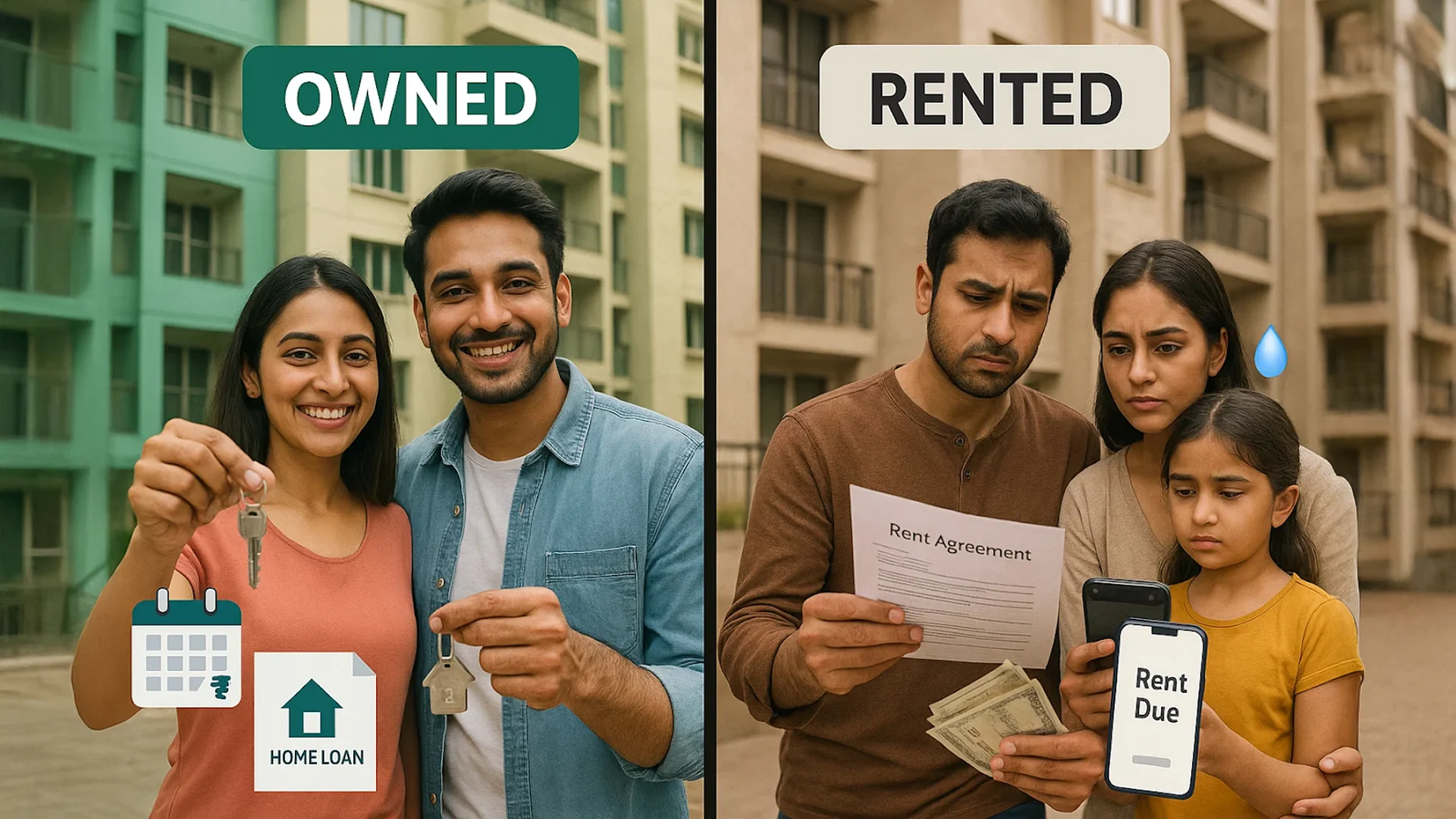Table of Content
▲
Finding a place to live in India involves more than just choosing a comfortable space; it’s often one of the most significant financial decisions a person can make. When I moved to a new city for work, I had to answer a question that many in India’s urban centers still face: Should I continue renting, or is it the right time to invest in a home under an affordable housing scheme?
On one hand, renting gave me the freedom to move, fewer responsibilities, and no major upfront costs. On the other hand, buying a house, especially through government-backed affordable housing projects, felt like a step toward long-term stability and ownership. But with property prices, interest rates, and rental values all on the rise, the decision wasn’t as easy as I’d thought.
In this article, I’ll break down what I learned while weighing the pros and cons of affordable housing vs. renting in India, from real costs and hidden expenses to government schemes, lifestyle choices, and returns on investment. If you’re trying to make the same decision, this might help you see the full picture.
.jpg)
Understanding Affordable Housing in India
Affordable housing refers to residential units that are financially accessible to individuals and families earning below a certain income threshold. These are not low-quality homes but thoughtfully designed properties intended for middle-income professionals, first-time buyers, and low-to-moderate income families.
The government’s definition of affordable housing varies by location. In metropolitan cities like Mumbai and Delhi, homes priced under ₹65 lakh typically fall into this category. In tier-2 and tier-3 cities, the limit is generally ₹45 lakh.
Affordable housing schemes often come with several financial incentives, including interest subsidies and reduced down payment requirements, making ownership more achievable for eligible buyers.
Also Read: Builder Floor vs Apartment: Understand Differences, Benefits, and Limitations
Why I Considered Buying Through an Affordable Housing Scheme
Purchasing a home appealed to me for reasons beyond financial investment. Homeownership brought a sense of permanence, stability, and the opportunity to build equity over time. My primary motivation was to stop paying rent indefinitely and begin investing in my own asset.
Some of the key advantages I considered included:
- Lower down payment, sometimes as low as 5 to 10 percent
- Access to the Pradhan Mantri Awas Yojana (PMAY) subsidy
- Tax benefits on principal repayment and interest under Sections 80C and 24(b)
- The potential for property value appreciation over time
Eventually, I purchased a 2BHK apartment in a developing suburb near Pune. The location had promising infrastructure plans, and the property was well within my budget. Over time, its value has steadily increased.
The Benefits of Renting: My Experience Before Buying
Before I decided to buy, I spent nearly five years living in rented accommodations. Renting suited my lifestyle at the time. It allowed me to change locations easily, live close to my workplace, and avoid the stress of long-term financial commitments.
Renting was especially advantageous during the early years of my career when job transfers were frequent and saving for a home was still in progress.
The main benefits of renting included:
- No upfront burden of a large down payment
- Ease of relocation without the need to sell or manage property
- Fewer responsibilities for property maintenance and repairs
- Lower monthly financial obligations compared to EMIs
For working professionals, students, or individuals in transferable roles, renting can offer flexibility that homeownership may not.
Cost Comparison: Renting vs Affordable Home Purchase
When comparing both options, I evaluated the actual and hidden costs involved in each.
Costs Associated with Buying:
- Down payment (typically 20 percent of property cost)
- Monthly EMI payments
- Stamp duty and registration fees
- Brokerage charges (if using a property agent)
- Interior work and furnishings
- Society maintenance and annual property taxes
Costs Associated with Renting:
- Security deposit (usually equivalent to two or three months' rent)
- Monthly rent
- Brokerage fees (often one month’s rent)
- Utility bills, internet charges, and minor repair expenses
Initially, renting appeared more cost-effective. However, over a three-to-five-year period, I realized I had spent a substantial amount without any return on investment. In contrast, a friend who had purchased property in the same period witnessed a 30 percent appreciation in value.
Factors That Influenced My Final Decision
Choosing between renting and buying ultimately came down to personal circumstances and long-term planning. These were the primary factors I considered:
- Job Stability: I was confident I would remain in the same city for the next five years.
- Affordability: Government subsidies and reduced down payment requirements made buying feasible.
- Long-Term Goals: I wanted to build a real estate asset that could later be rented or sold.
- Lifestyle Needs: Frequent relocations were no longer ideal, and I wanted a permanent residence.
Also Read: Notarized vs. Registered Rent Agreement: What’s Best for Your Rental Needs?
Conclusion
After experiencing both renting and owning, I came to understand that the decision is not solely financial. It is deeply personal and influenced by career plans, income stability, family needs, and future aspirations.
Renting provided the flexibility and low-risk comfort I needed at the beginning of my career. Homeownership, on the other hand, gave me stability, tax advantages, and a growing asset. Both have their place in one’s housing journey.
Anyone evaluating this decision should assess their current financial position, plans, and lifestyle preferences. Consider the total cost of ownership versus renting over time, not just the monthly outflow. Take advantage of government incentives if you’re eligible, and consult a financial advisor when needed.
There is no universally correct answer, but there is a choice that aligns best with your life stage and long-term goals.









_1771582392.webp)
_1771577585.webp)
Ans 1. It depends on your life stage. Renting is great for flexibility and short-term savings, while buying under an affordable housing scheme offers long-term security, tax benefits, and asset creation.
Ans 2. In metro cities, homes priced up to ₹65 lakh fall under affordable housing. In tier-2 and tier-3 cities, the limit is around ₹45 lakh. These homes often come with government subsidies like PMAY.
Ans 3. Apart from EMIs, buyers need to factor in the down payment, stamp duty, registration, maintenance, and furnishing costs. However, these also go toward building a tangible asset.
Ans 4. Yes, especially if you need flexibility due to career moves or financial constraints. Renters avoid high upfront costs and property maintenance responsibilities.
Ans 5. Ask yourself: Do I plan to stay in one city for at least 4–5 years? Can I afford a down payment without straining my finances? If yes, buying may be a better choice. If not, renting is more practical for now.